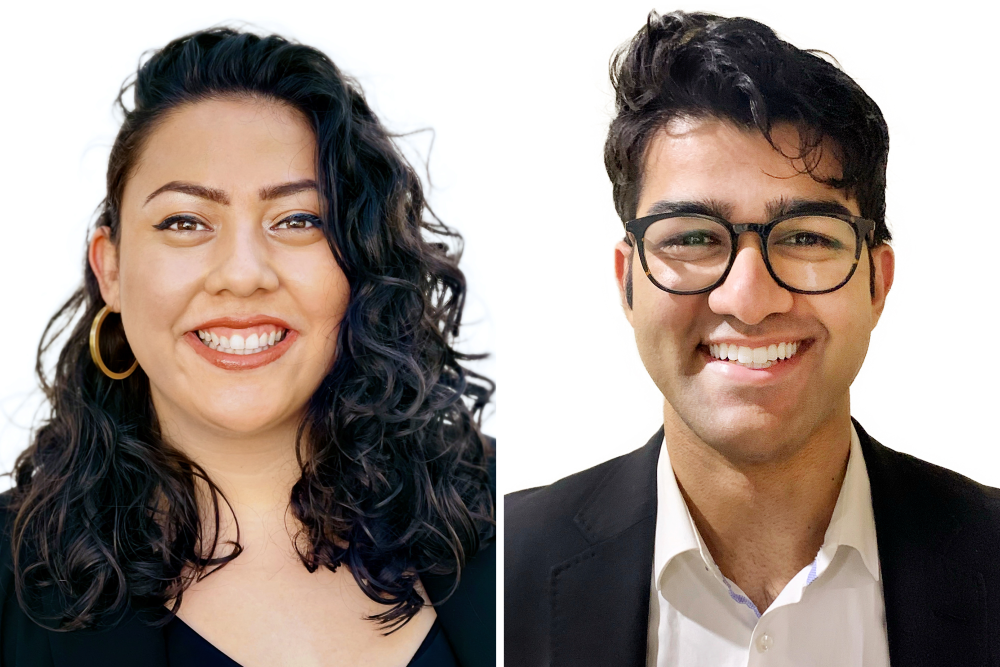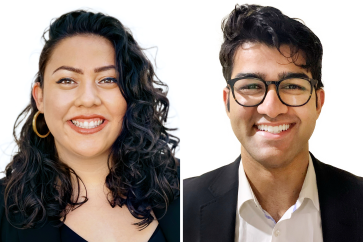Paul & Daisy Soros Fellowships awarded to 2 UCLA College students
Doctoral student Janel Pineda and 2020 alumnus Nathan Mallipeddi earn prestigious honor

Courtesy of The Paul & Daisy Soros Fellowships for New Americans
PD Soros Fellows Janel Pineda and Nathan Mallipeddi.
Alvaro Castillo | April 25, 2023
What do a poet and a medical/business student have in common? Well, a lot, it turns out. Janel Pineda, a doctoral student in Chicana/o and Central American studies and Nathan Mallipeddi, a 2020 graduate in biology, were named to the 2023 cohort for the Paul & Daisy Soros Graduate School Fellowship for New Americans.
“Janel and Nathan are both outstanding even though they’re in very different fields; what they share is creativity, high-impact leadership and a commitment to the community,” says Rebecca Blustein, assistant director for UCLA’s Center for Scholarships and Scholar Enrichment. “They embody the ideals of the PD Soros Fellowships, which recognizes the leadership and diverse contributions of New Americans.”
Every year, the Paul and Daisy Soros Foundation, which aims to honor the contributions of immigrants and children of immigrants to the United States, receives 2,000 applications for 30 graduate school fellowships. Pineda and Mallipeddi will each receive $90,000 over two years and join a lifelong community of fellows.
Pineda, a poet, scholar of Central American studies and daughter of Salvadoran immigrants, is a first-year doctoral student in Chicana/o and Central American studies whose work investigates the ways that poetry can be used to counteract narrative silencing and to reclaim familial and cultural stories. Before arriving at UCLA, Pineda earned a B.A. in English from Dickinson College, an M.A. in creative writing and education from Goldsmiths, University of London, and an M.Phil. in Latin American studies from the University of Cambridge.
Born in Cincinnati, Ohio, and the son of immigrants from Andhra Pradesh, India, Mallipeddi pursued projects in biology and public policy during his undergraduate UCLA experience, including discovering a groundbreaking function of histone proteins as copper reductase enzymes, building a policy framework to understand how disabilities are defined and operationalized and developing public policy programs that provide employment opportunities to persons with disabilities in Los Angeles. He is currently an M.D./M.B.A. student at Harvard Medical School and the Stanford Graduate School of Business.
Join us in celebrating two outstanding UCLA College lights:
Janel Pineda
What did the UCLA College teach you about yourself?
Pursuing my Ph.D. at UCLA’s César E. Chávez Department of Chicana/o and Central American Studies has enabled me to work within a community of caring, thoughtful scholars who are committed to research that extends beyond the confines of academia and directly serves local communities. I am thrilled that the Paul & Daisy Soros Fellowship will help fund my doctoral study of U.S. Central American literature and of exploring the liberatory capacities of poetry for Central American families.
How have your experiences at UCLA prepared you to become a Paul & Daisy Soros Fellow?
At UCLA, I am thrilled to be working under the mentorship of assistant professor Karina Alma to advance literary scholarship within the emergent and vital field of Central American studies. Dr. Alma’s leadership within the field and continual support have been invaluable to my journey as a doctoral student and to my pursuit of the PD Soros Fellowship.
Why do you love your field?
I love poetry because I believe deeply in its ability to move people, to transform communities and to serve as a guide that will help us build a better world. As I work to uplift Central American stories through poetry, I feel deeply honored to be working alongside a community of Central American scholars to build the field of Central American studies in the United States — a field that has been deeply community-engaged and committed to a politic of justice.
What does being a New American mean to you?
It means that I have a commitment both to the diasporic communities I am a part of in the United States and to the communities in El Salvador, my family’s homeland. As a New American, I am moved by the possibilities for transnational solidarity through a bidirectional exchange of stories, lived experience and artistic expression.
Nathan Mallipeddi
What did the UCLA College teach you about yourself?
My time at UCLA was one of the most transformative experiences of my life. Along with making lifelong friends, I learned how to develop a healthy and balanced mindset. UCLA taught me to always consider the ripple effects of the work I am doing. Every moment in every day is an opportunity to impact someone else, whether it’s a hallway conversation with an acquaintance or a small interaction with the Charles E. Young Research Library custodial staff late at night during finals week. I’m forever grateful for my time at UCLA that taught me these invaluable lessons that I use every day.
How have your experiences at UCLA prepared you to become a Paul & Daisy Soros Fellow?
At UCLA, I received the Strauss and Fulbright scholarships to build the organization and conduct research on stigma that people who stutter face in health care settings. I met many mentors — Rebecca Blustein from the CSSE and associate professor of linguistics Jesse Harris, to name a few — who were crucial in helping me develop the organization. I also had the opportunity to conduct independent research in both the basic and social sciences. This work helped me nurture my curiosity, creativity and independent thinking. Altogether, these experiences set me up well to find my purpose — building systemic solutions that change the lives of persons with communication disorders.
Why do you love your field?
I love medicine because it enables a combination of thinking about science, solving problems and changing lives. I am excited by the opportunity to build systems and tools that can create a better world for all.
What does being a New American mean to you?
To me, being a child of immigrants means to never forget my family’s courage and to apply that inspiration by paying it forward to my community.
For more of Our Stories at the College, click here.




